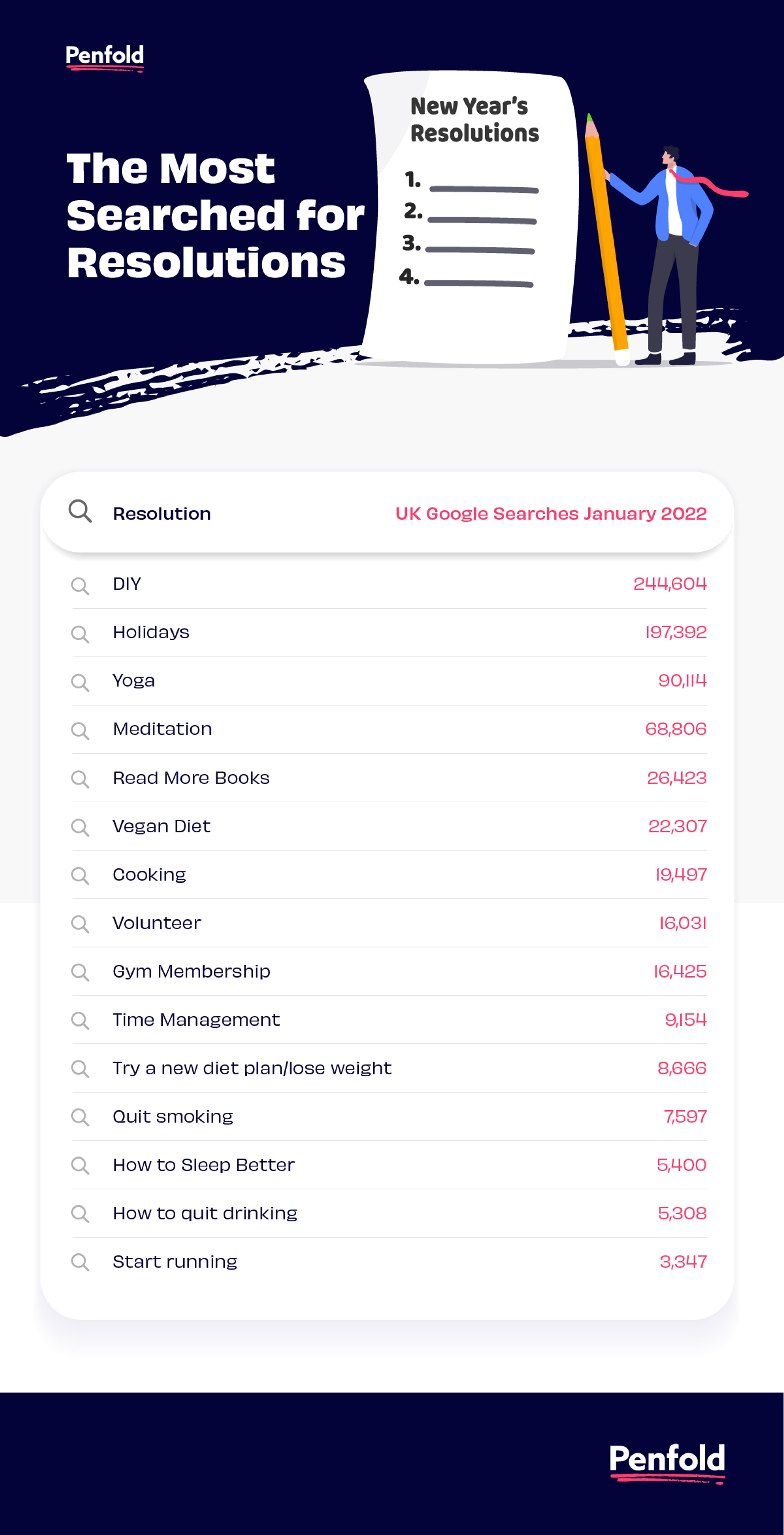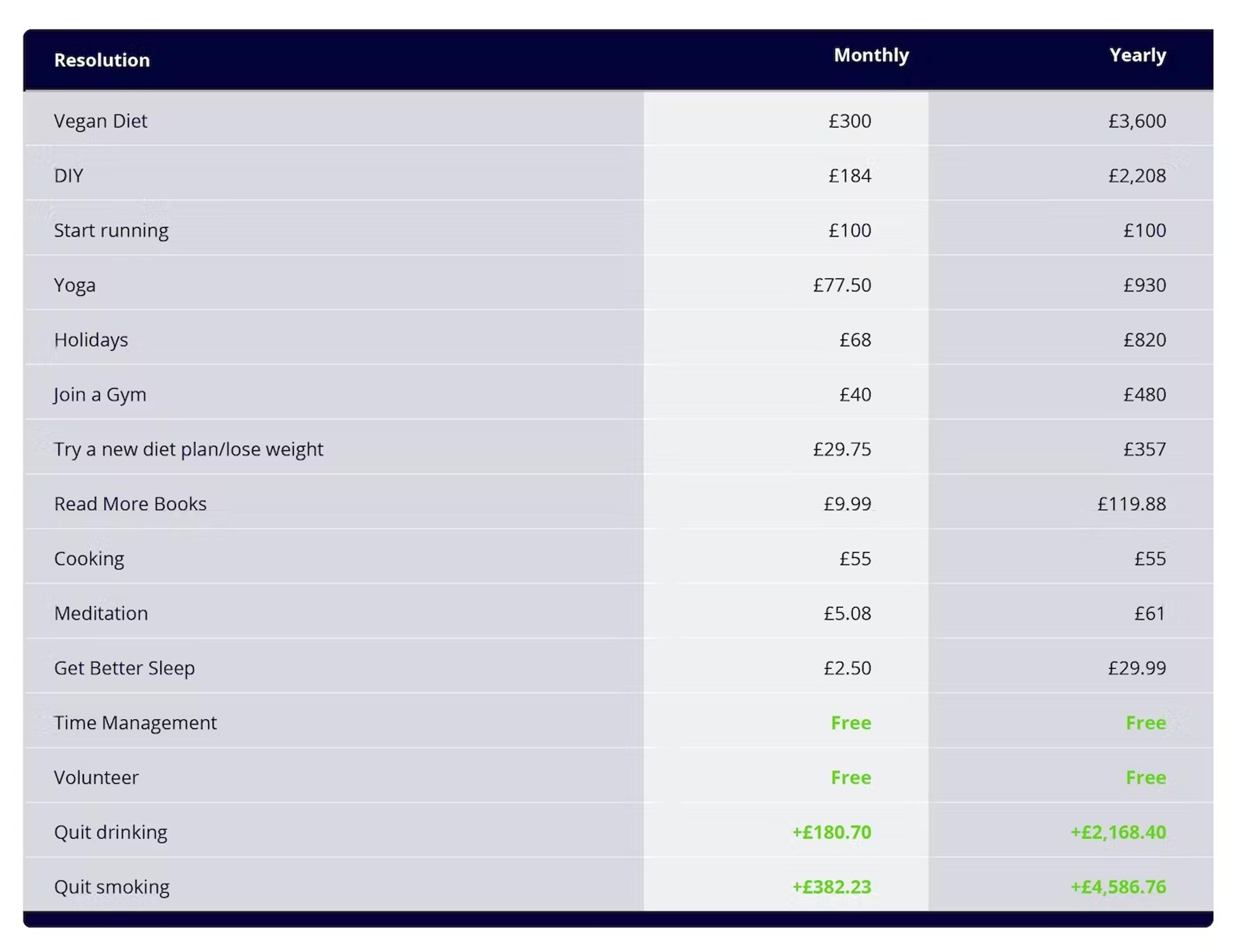The Most Expensive New Year’s Resolutions 2023
- By
- Frankie Dewar

New Year's resolutions seldom stick. 24% of people surveyed wished to live more economically at the start of their New Year’s plans, so what should we be doing to ensure we stick with our resolutions and are more economical with our money in 2023?
Each year we promise ourselves that we will make a change for the better. Whether it’s breaking certain habits or making new ones, it’s common that we strive to improve ourselves one way or another once January begins.
Starting our New Year's resolutions can be easy, but sticking to them proves to be the more difficult element as we strive forward with a “new year, new me” mentality. Whether it’s due to making too many resolutions, not keeping track of progress or setting unrealistic targets, there are numerous reasons that we might not succeed in our New Year's resolution goals.
When habits don’t last, this comes at a cost, financial and otherwise. This begs the question, how much money will each of our New Year’s resolutions cost us? Are they worth it if they usually don’t last longer than a month? Only about 16% of people can follow their resolutions, according to research. The majority give up within one to six weeks of starting, and many of these resolutions are repeated year after year.
Only about 16% of people can follow their resolutions.
Here are the top New Year's resolutions we can expect to see people attempt as we enter 2023, how long they last and how cost-effective they are when compared with one another.
The Most Popular New Year's Resolutions
Based on search volume, the most popular New Year’s resolutions include the following:

DIY is the most popular resolution trend as it hits January when Brits look to freshen up their home for the new year. In January 2022 “DIY” saw 244,604 searches in the UK. According to a recent survey, the average UK homeowner admitted to spending £1,473 on home DIY projects in the first 8 months of 2022 - that’s £184 per month! Whilst this may be a nice new year activity, be sure to only do the jobs you have the training to do, a botched DIY job can add between £100 - £500 on top of the initial cost of the work.
Holidays had the second-highest Google search volume last January, with 197,392 searches. According to research, on average Brits will spend less than £400 per person on holidays, however, around a third of holidaymakers aged 25 to 35 would splash out and spend between one and two thousand pounds on holidays per year. On top of this on average UK holidaymakers are budgeting £420 per person to spend while on a one-week holiday – which includes things like food, drink and activities. So it may add up to quite a costly resolution if you plan on travelling multiple times a year!
Many Brits are searching for peace in the new year with tranquil activities such as Yoga and Meditation taking the third and fourth spots in most-searched-for resolutions. There were 90,114 searches for Yoga and 68,806 searches for meditation apps last January. Looking at the top 13 meditation apps, the average meditation app will cost £61 a year which is approximately £5.08 a month. The trouble here is sticking with the plan, as most will not carry on with their spiritual journey after the first 6 weeks, even though they are locked in for 12 months of payments.
The UK’s fifth most popular resolution is to “read more books”, with a search volume of 26,423. The average cost of a paperback book in the UK is £9.99, whilst books remain a relatively affordable form of entertainment, in 2023 with production costs on the rise this is set to increase 10 - 20%. If you don’t mind not reading the latest releases, Charity Shops are a great place to start, picking up books for as little as 10p.
Many people choose to take up exercise in the New Year with searches for “Gym Membership” peaking in January at 16,425. A gym membership will cost £40 a month on average, but this isn’t the only expense involved when it comes to getting in shape after the holidays. Those who take up running will have to buy a good pair of trainers, which average out at £100 a pair, and may never be used again after the first couple of uses.
Quitting drinking and smoking have been resolutions frequently attempted by many over the years. Unlike other resolutions, these involved stopping something rather than taking action, meaning cutting out alcohol and cigarettes are financially the best option. The average UK household spends £11.30 on alcoholic drinks per week. Over a year, this adds up to £587.60 and is more than we spend buying meat and fish products each year. If an individual drinks the maximum recommended number of units, 10 small glasses of wine per week (14 units) they could save up to £2,168.40 a year by giving up alcohol. Even participating in one month of sobriety, could save £180.70 per person, or £107.12 for a beer drinker.
The same goes for smoking, the average UK smoker smokes 20 cigarettes a day and as a 20-pack will now cost £12.33, cutting out smoking, even for a month will save £382.23 or £4,586.76 over 12 months.
The Most Expensive Resolutions
January 14th has been coined as Quitter’s Day, the day that most people give up on their New Year’s resolutions. Just two weeks after the New Year begins, promises people have made to themselves are quickly broken.
Turning Vegan is the most expensive New Year’s resolution, according to research. When it comes to Groceries, Vegans have the highest monthly spending at £300 per month, £74 more than those with no dietary restrictions. Over the year, this means a vegan can spend up to £3,600 a year, just on groceries, 28% more than the national average (£2,829).
Turning Vegan is the most expensive New Year’s resolution
Decorating your home is the second most expensive New Year's resolution. By Quitter’s Day, up to £184 will be spent on this resolution. While decorating your home may feel like an attainable resolution, within this length of time, only one room may be complete and at a somewhat steep price.
Taking up running may be the third most expensive resolution - especially if you quit by quitters day. Although it only takes determination and perseverance to get to your local Park Run, if you splash out on the correct running shoes, you’re down £100 you’re never getting back. Yoga classes are the fourth most expensive resolution, with prices of £15.50 on average per session assuming you were taking part once a week, if you quit by the end of the month you’ll have already spent £77.50 and that’s not including the extra yoga kit you’ve bought.

How Long do Resolutions Last?
Research has shown that after one week 75% are still successful in keeping their resolutions. While a quarter can keep up their positive habits, this figure dips after two weeks, with the success rate dropping to 71%. This trend continues; after one month, the number drops again to 64%, hitting a low of 46% after 6 months have passed.
The reasons for failure differ, but it has been shown that 35% of participants who failed their New Year’s Resolutions said they had unrealistic goals, 33% of participants who failed didn’t keep track of their progress, and 23% forgot about their resolutions. And roughly 10% said they had too many resolutions, diluting their foresight and hindering their ability to achieve their goals.
In addition to this, nearly 33% of people give up on their New Year’s resolutions by the end of January, meaning a third of the population can’t seem to stick it out for a full month. It’s estimated that people in the UK spend an average of £187 on their New Year’s resolution, which they then later give up, but some resolutions are more expensive than others.
How to Stick with your New Year Goals in 2023
Past studies and surveys have concluded that, by February, as many as 80% of New Year’s resolutions will have been abandoned. This suggests that we’re approaching New Year’s resolutions all wrong.
By February, as many as 80% of New Year’s resolutions will have been abandoned.
What if, instead of setting impossible-to-achieve goals and watching them fail like clockwork each year, we tried to better understand the psychology behind our goals?
Although sticking with your resolutions may not be easy, there are numerous ways in which you can conquer them.
Start with small goals
Starting with smaller goals is a great way to keep you motivated, and excited about your goal and stay on track. This will help you avoid discouragement as there won’t be too much pressure, or too much on your plate at once.
Make it measurable
Making your goal measurable will make it more easily attainable. If you are trying to save a certain amount of money, keep a log of your outgoings. If you wish to exercise more, set the amount of time you are aiming for each day. By assigning measurements, you can specify what success looks like to you.
Make a plan
Set your goals according to your lifestyle and with what you will be able to achieve, otherwise, you might lose your motivation. Be honest with yourself and be sure to consider the resources and time you have available to help you meet your goals, taking into account the cost of your resolution for the year ahead, seeing it as more of a lifestyle change than a resolution to ensure money and time is not wasted.
Frankie Dewar